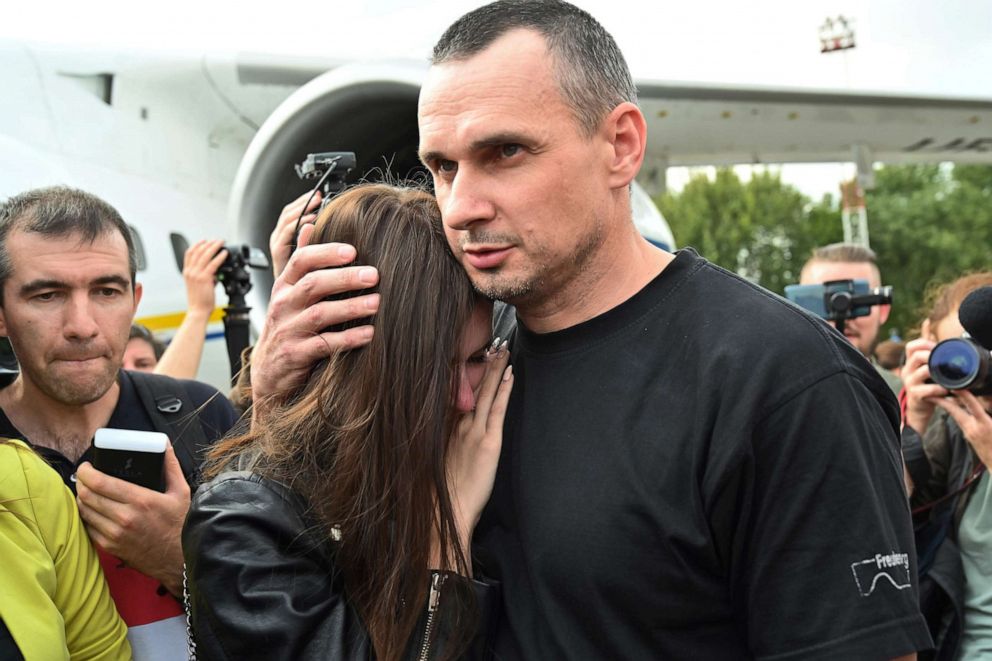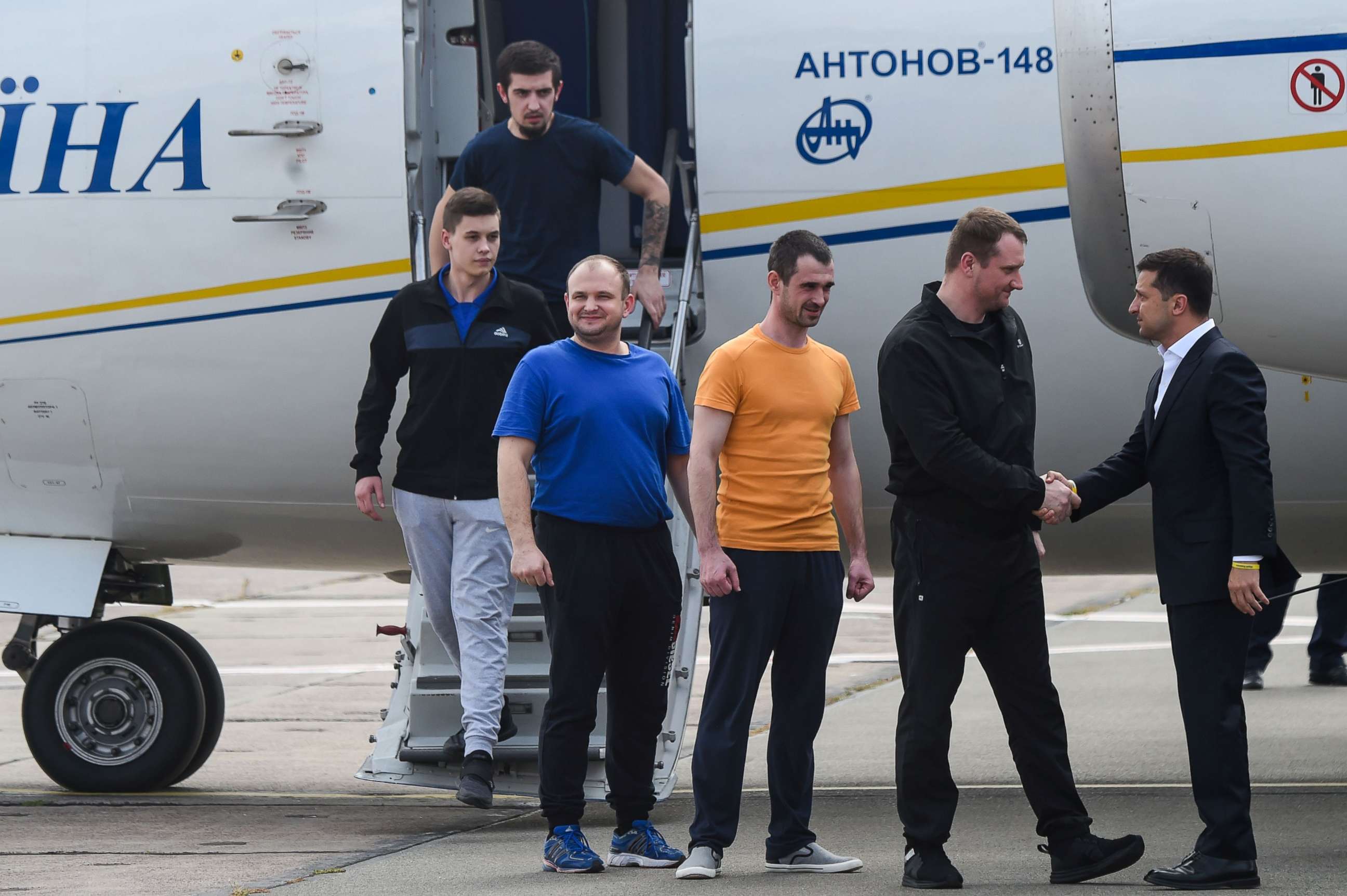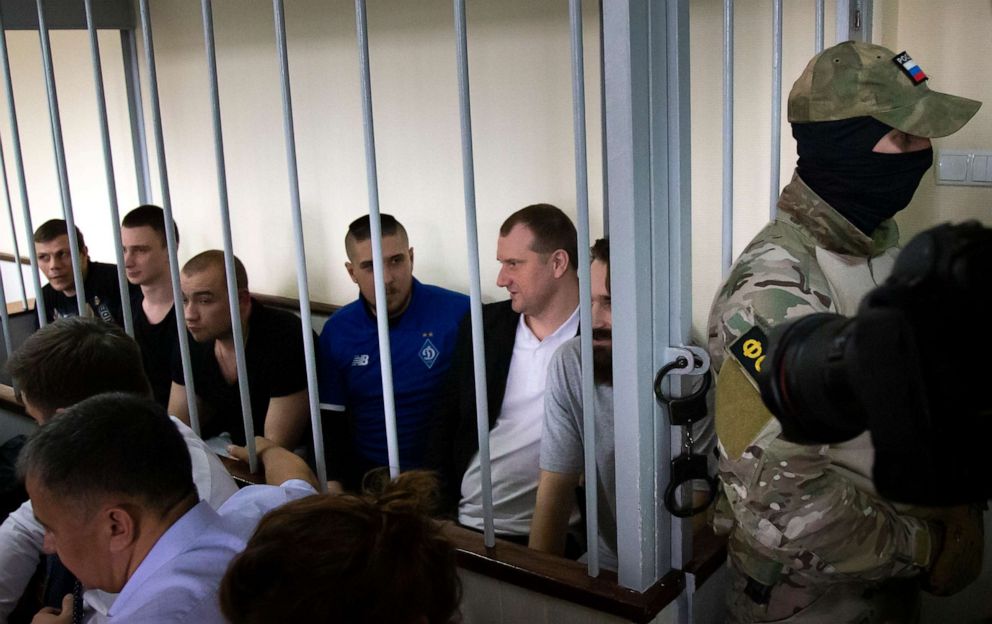Russia, Ukraine hold prisoner exchange in major diplomatic breakthrough
Among those freed is director Oleg Senstov and 24 Ukrainian sailors.
MOSCOW -- Russia and Ukraine on Saturday completed a highly-anticipated major prisoner exchange, that saw Russia hand over the Ukrainian film director Oleg Sentsov and 24 Ukrainian sailors who were seized during a naval confrontation last year in return for a key witness in the shooting down of Malaysian Airlines flight MH17.
The exchange has major significance for the conflict between Russia and Ukraine and potentially for relations between Moscow and the West, amid a renewed European diplomatic push to try to improve the relationship after half a decade of tension.
The two sides agreed to trade 35 prisoners each. Two planes carrying the prisoners took off simultaneously from Moscow and Kyiv on Saturday. Ukraine's president, Volodymyr Zelensky, met the plane carrying the Ukrainian prisoners on the tarmac at Kyiv's Borispol airport, shaking hands and embracing some of the men. Among them was Sentsov and the 24 sailors.

Among the prisoners on the Moscow-bound plane was Russian state news agency journalist Kirill Vyshinsky, who a Ukrainian court released on bail last week and who posted a video of himself about to board the aircraft. Also reportedly on board was Volodymyr Tsemakh, the former pro-Russian separatist fighter wanted as a witness by prosecutors investigating the shooting down of MH17, who was apparently traded against prosecutors' wishes.
Zelensky's presidential office posted a full list of the 35 Ukrainians released. The Ukrainian newspaper, Ukrayinska Pravda, also published a list of the 35 returned to Russia, which included Tsemakh's name.
After meeting the men, Zelensky told reporters that he believed the exchange represented the completion of the “first step” to ending the war between Russia and Ukraine in eastern Ukraine.
“I believe that the first step is complete. I should confirm that I, Ukraine’s President Volodymyr Zelensky and Russia’s President Vladimir Putin have done everything that we promised, without changing our agreement along the way,” Zelensky told reporters at a press conference on the runway.
"I am sure that we know what to do next," Zelensky said, saying Russia and Ukraine must now take steps to fulfill the Minsk Agreements, a peace plan agreed to in February 2015 but which has stalled until now. "We must take all the steps to end this horrible war," he said.
The exact list of who would be included in the prisoner exchange has been shrouded in secrecy amid negotiations over the past week, though there had been signs for almost three weeks that Sentsov and the sailors would be part of any trade. Some of those exchanged had already been sentenced and Zelensky this week pardoned 16 of the prisoners; Putin pardoned 10 of the Ukrainians, among them Sentsov.
The exchange is the most significant diplomatic breakthrough between Russia and Ukraine in years. It also raises the possibility that the two sides might now be ready to try to move the five-year war to a new, less violent stage, which in turn would help ease the prolonged confrontation between Russia and the West, including the United States.
It also comes as Europe is mounting a new effort to fulling end the war, led by France’s Emmanuel Macron and backed by Germany, in the hope of capitalizing on what they believe is an opening provided by Zelensky's election. Officials from France, Germany, Ukraine and Russia have been meeting recently to discuss restarting the high-level talks, known as the "Normandy Format," which have not been held since 2016. The successful completion of the prisoner exchange was seen as a first condition for proving the two sides were ready to re-open the talks.
Macron on Saturday wrote in a tweet that he "hailed" the release of Sentsov.
The exchange could also signal a new willingness by the Kremlin and Ukraine try to put a final end to the fighting in eastern Ukraine, which despite a 2015 peace deal, continues to kill people every month. The conflict has resulted in more than 10,000 deaths since the war began in 2014. This week Putin said the exchange would be a "major and good step forward, towards normalization."
President Donald Trump on Saturday cheered the exchange, writing on Twitter: "Russia and Ukraine just swapped large numbers of prisoners. Very good news, perhaps a first giant step to peace. Congratulations to both countries!"
The U.S. embassy in Kyiv also issued a statement saying it was "encouraged to see signs of a more robust dialogue between Russia and Ukraine," noting Zelensky "had made a clear commitment to achieving a diplomatic solution" to the conflict. It added though a call for "Russia to cease its aggression against Ukraine and to release the many other Ukrainians who remain unjustly in Russian custody.”
The release of Sentsov is particularly significant. The film director was one of Russia’s most high-profile political prisoners. He was arrested shortly after Russia's invasion of his native Crimea in 2014 and sentenced to 20 years in a prison colony on terrorism charges that international human rights groups condemned as trumped up. His case attracted major global attention, with many prominent film industry figures calling for his release, including stars such as Johnny Depp and Sir Patrick Stewart.
Sentsov, who was held in a remote penal colony in the Russian Arctic, has become a hero in Ukraine. He went on hunger strike for 145 days last year, demanding that Russia release all Ukrainian political prisoners.
After leaving the plane on Saturday, Sentsov thanked those who had campaigned for his freedom and said he hoped other Ukrainians still held would be freed soon.
The scenes of the two homecomings, broadcast on TV, were strikingly different. In Moscow, there was almost no welcoming party to meet the now freed captives, beyond Dmitry Kiselyov, known as a a top Kremlin propagandist who hosts Russian state TV's main weekly news show. He hugged Vyshinsky, but the others stood waiting alone for a bus on the tarmac. In Kyiv, by contrast, the men were met by an emotional crowd of families and journalists, and there were tearful reunions.

The release of the 24 sailors also ends what Europe and the United States had effectively considered a hostage-taking by Russia. Russia captured the sailors when it seized three Ukrainian naval vessels as they tried to pass through the Kerch Strait close to Crimea in November. Russians vessels fired on and then rammed the Ukrainian ships, which they asserted had violated Russian waters. Afterward Russia put the sailors on trial. The case was a major source of contention with European countries, which demanded the men be released and sent diplomats to attend each hearing as a sign of solidarity with Ukraine.
But the exchange's most controversial element involves Tsemakh, who had been the only key MH17 witness in custody. A former pro-Russian rebel commander, Tsemakh was in charge of anti-air defenses in the area where a Russian-supplied missile was fired at the airliner in July 2014. He was also caught on video appearing to talk about hiding the Buk missile's launcher afterward.
Ukraine captured Tsemakh in June during a special operation in the pro-Russian rebel-held territory, and the Dutch-led international commission that has been investigating the downing of the place had said they wanted to question him. Dutch prosecutors have brought murder charges against four senior rebel commanders in a trial that is due to begin in March, but all remain out of reach in Russian-controlled territory. Some believe Tsemakh himself could have potentially been treated as a suspect.

His handing over to Russia means it is now very unlikely he will ever appear in a European court. Russia has refused to cooperate with the investigation and has continued to deny any involvement, despite extensive evidence found by the commission that the missile came from a Russian army unit and was fired by rebels who likely mistook the passenger airliner for a Ukrainian military plane.
Tsemakh was traded over the objections this week of 40 members of the European Parliament who published an open letter to Zelensky arguing against trading Tsemakh.
The Netherlands' foreign minister, Stef Blok told the Dutch parliament in a letter on Saturday that prosecutors had been able to question Tsemakh before he was handed over, although that he wrote he still "deeply regretted" Tsemakh had been sent to Russia. Blok said the Dutch government had repeatedly pressed Ukraine not to exchange Tsemakh.
Tsemakh's inclusion had appeared as a crucial sticking point in the negotiations around the exchange, which seemed to be delayed last week. The head of Ukraine's SBU domestic security agency, Ivan Bakanov told Interfax-Ukraine news agency after the swap that Tsemakh not being included "would have automatically led to a halt in negotiations with Moscow."
Ukraine's former president Petro Poroshenko, who was defeated by Zelensky this year, said on Friday that Russia's demand that Tsemakh be included was an "admission of responsibility" by Moscow for the downing of the plane.
Zelensky said that following the prisoner exchange, the next step would be to move closer to returning all Ukrainian prisoners and the following step would be to move onto troop withdrawals laid out according to the Minsk agreements, a peace roadmap that was agreed upon in February 2015 and which ended large-scale fighting, but which has since been stalled.
After troop withdrawals, Zelensky said, they could then move on to a full cease-fire and an end of the war.
The exchange raises hopes that both sides might now be willing to fulfill elements of the Minsk agreement they have previously ignored, though many doubts remain.




